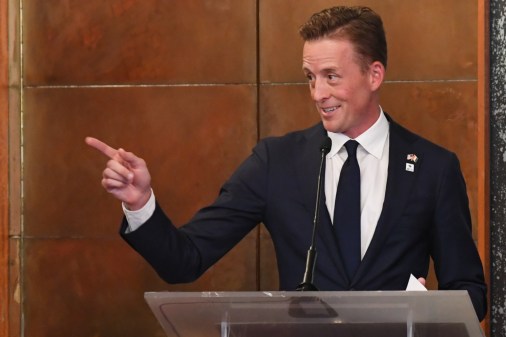National cyber director says U.S. needs to counter Chinese surveillance, push American tech

The United States needs to counter China’s “attempt to export a surveillance state across planet Earth,” and instead push a “clean American tech stack” globally, National Cyber Director Sean Cairncross said Friday.
“It’s important that we send that message and engage with not only partners that we have now, but potential partners who are looking for assistance and open to help in that regard,” Cairncross said in remarks at the 2025 Meridian Summit in Washington, D.C.
The Chinese threat promises to be a big focus for Cairncross, a message he’s been sending in his short tenure thus far.
“To date, I don’t think the United States has done a terrific job of sending the signal, in particular to China, that their behavior in this space is unacceptable,” he said. “It’s meant to do us harm. It sits on our critical infrastructure systems and threatens chaos.
“It tries to put us in strategic dilemmas that impact our decisionmaking,” Cairncross continued about Beijing. “And that is something that is scaling. It is something that is seen as cost-free, I think, across the ocean, and that is something that needs to be reset so that there is strategic stability in this domain.”
Cairncross said the United States’ own national cybersecurity strategy under President Donald Trump won’t be as explicit in its directions as past editions. He said it wouldn’t be 100 pages long, either.
“It will be setting the posture of the United States in this domain and things that we are driving toward, and we will have follow-on action items that will be in support of that strategy,” he told the audience at the event.
His first priority in the office will be to establish it in the role that Congress and the executive branch had in mind when it created it. Lawmakers did so in response to a recommendation from the Cyberspace Solarium Commission.
The successor organization to the commission, CSC 2.0, made a list of recommendations this week, one of which was that policymakers should take action to further strengthen the office. The CSC 2.0 annual implementation report said the office doesn’t have the authority to perform its mission as intended.
Bolstering ONCD is “the most likely first step,” Executive Director Mark Montgomery told reporters this week, a point former commission co-chairs Mike Gallagher and Sen. Angus King, I-Maine, agree with. And that’s “mostly because of Cairncross’s relationships,” Montgomery added. Cairncross worked in the first Trump administration and has been an official with the Republican National Committee.
The National Security Council under Trump is “properly deferential to giving NCD the battle space” it needs to perform its role, Montgomery said.
Also Friday, Cairncross called on Congress to renew the Cybersecurity Information Sharing Act of 2015 for 10 years. The law expired earlier this month, sounding alarms in the private sector and among cyber experts who say its legal protections have been vital to the sharing of cyber threat data.
Another administration official had previously said it would accept any length of extension.
Updated, 10/24/25: to include information about CISA 2015.






